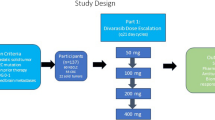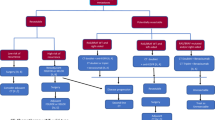Abstract
At the moment, targeted therapy in metastatic colorectal cancer (mCRC) is a hot topic which is widely discussed in the scientific community. Approximately 25 % of all CRC patients present with metastases at the time of initial diagnosis, and an additional 50 % of them will develop metastases during the subsequent course of their disease, contributing to the high mortality rates reported. Novel targeted agents like monoclonal antibodies directed against vascular endothelial growth factors or against epidermal growth factor receptor combined with chemotherapy as well as multikinase inhibitors (in the salvage setting) have demonstrated to result in improved therapeutic outcome in patients with mCRC. Recent research efforts have focused to define patient subpopulations, who benefit most from the respective treatments. KRAS mutations in codons 12 and 13 are found in approximately 40 % of all patients with mCRC. These clinicopathologic characteristics generate consecutive activation of the mitogen-activated protein kinase pathway. Less frequent activating KRAS mutations occur in codons 61 and 146, and there are the NRAS mutations in codons 12, 13, and 61. The gene expression profiles of the RAS genes help to define those patients who are most likely to benefit from certain biological agents. This review discusses the therapeutic options based on recent publications.
Similar content being viewed by others
References
Ferlay J, Steliarova-Foucher E, Lortet-Tieulent J, et al. Cancer incidence and mortality patterns in Europe: estimates for 40 countries in 2012. Eur J Cancer. 2013;49:1374–403.
Ferlay J, Parkin DM, Steliarova-Fouchera E. Estimates of cancer incidence and mortality in Europe in 2008. Eur J Cancer. 2010;46:765–81.
Van Cutsem E, Cervantes A, Nordlinger B, et al. Metastatic colorectal cancer: ESMO Clinical Practice Guidelines for diagnosis, treatment and follow-up. Ann Oncol. 2014;25(Suppl. 3):iii1–9.
Stintzing S. First-line treatment in mCRC: decisions based on molecular biomarkers. Oncol Res Treat. 2014;37(Suppl. 5):115(abstr V381).
Scheithauer W. Aktuelle Medikamentöse Therapie des kolorektalen Karzinoms. Pharmainformation. 2014;29(3):1.
Misale S, Yaeger R, Hobor S, et al. Emergence of KRAS mutations and acquired resistance to anti-EGFR therapy in colorectal cancer. Nature. 2012;486:532–6.
Morris VK, San Lucas FA, Overman MJ, et al. Clinicopathologic characteristics and gene expression analyses of non-KRAS 12/13, RAS-mutated metastatic colorectal cancer. Ann Oncol. 2014;25:2008–14.
De Roock W, Claes B, Bernasconi D, et al. Effects of KRAS, BRAF, NRAS, and PIK3CA mutations on the efficacy of cetuximab plus chemotherapy in chemotherapy-refractory metastatic colorectal cancer: a retrospective consortium analysis. Lancet Oncol. 2010;11(8):753–62.
Falcone A, Ricci S, Brunetti I, et al. Phase III trial of infusional fluorouracil, leucovorin, oxaliplatin, and irinotecan (FOLFOXIRI) compared with infusional fluorouracil, leucovorin, and irinotecan (FOLFIRI) as first-line treatment for metastatic colorectal cancer: the Gruppo Oncologico Nord Ovest. J Clin Oncol. 2007;25:1670–6.
Souglakos J, Androulakis N, Syrigos K, et al. FOLFOXIRI (folinic acid, 5-fluorouracil, oxaliplatin and irinotecan) vs FOLFIRI (folinic acid, 5-fluorouracil and irinotecan) as first-line treatment in metastatic colorectal cancer (MCC): a multicentre randomised phase III trial from the Hellenic Oncology Research Group (HORG). Br J Cancer. 2006;94:798–805.
Loupakis F, Cremolini C, Lonardi S, et al. Subgroup analyses in RAS mutant, BRAF mutant and all-wt mCRC pts treated with FOLFOXIRI plus bevacizumab (bev) or FOLFIRI plus bev in the TRIBE study. J Clin Oncol. 2014;32:abstr.3519.
Schwartzberg LS, Rivera F, Karthaus M, et al. PEAK: a randomized, multicenter phase II study of panitumumab plus modified fluorouracil, leucovorin, and oxaliplatin (mFOLFOX6) or bevacizumab Plus mFOLFOX6 in patients with previously untreated, unresectable, wild-type KRAS exon 2 metastatic colorectal cancer. J Clin Oncol. 2014;32:2240–7.
Heinemann V, Fischer von Weikersthal L, Decker T, et al. FOLFIRI plus cetuximab versus FOLFIRI plus bevacizumab as first-line treatment for patients with metastatic colorectal cancer (FIRE-3): a randomized, open-label, phase 3 trial. Lancet Oncol. 2014;15:1065–75.
Venook AP, Niedzwiecki D, Lenz HJ, et al. CALGB/SWOG 80405: Phase III trial of irinotecan/5-FU/leucovorin (FOLFIRI) or oxaliplatin/5-FU/leucovorin (mFOLFOX6) with bevacizumab (BV) or cetuximab (CET) for patients (pts) with KRAS wild-type (wt) untreated metastatic adenocarcinoma of the colon or rectum (MCRC). Proc Am Soc Clin Oncol. 2014;32(Suppl. 15):LBA3 (abstr).
Cremolini C, Loupakis F, Masi G, et al. FOLFOXIRI/bevacizumab versus FOLFIRI/bevacizumab as first-line treatment in unresectable metastatic colorectal cancer: results of phase III TRIBE trial by GONO Group. Ann Oncol. 2013;24(Suppl. 4):iv21.
Acknowledgment
The author thanks WS and Mrs. Director for support.
Take-home message
Until now, the use of all chemotherapy regimens (FOLFOX, FOLFIRI) in combination with an antibody should be considered in patients with metastatic colorectal cancer. The treatment decision is complex and depends on molecular markers, clinical factors, as well as patient preferences.
Conflicts of interest
The author declares that the research was conducted in the absence of any commercial or financial relationships that could be constructed as a potential conflict of interest.
Author information
Authors and Affiliations
Corresponding author
Rights and permissions
About this article
Cite this article
Ulrich-Pur, H. New targets in metastatic colorectal cancer. memo 8, 101–104 (2015). https://doi.org/10.1007/s12254-014-0191-3
Received:
Accepted:
Published:
Issue Date:
DOI: https://doi.org/10.1007/s12254-014-0191-3




